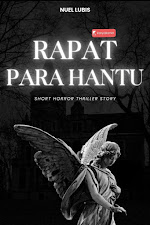"Komik sering dikatakan hanya sebagai alat hiburan, penghilang stress. Namun pernahkah terpikir bahwa ada segudang pengetahuan di balik komik dan buku ceritera anak-anak? Seringkali menjelaskan sesuatu akan lebih gampang jika dibalut dalam bentuk komik... dan fiksi."
 |
Terdengar seperti imajinasi liar nan berlebihan penulis cerita atau komikusnya, kan? Namun apa yang tertera di sana, yang merupakan potongan dari SERIAL PAMAN GOBER EDISI TEMATIS NO. 7: RIVAL, sesungguhnya berdasarkan kisah-kisah nyata lainnya yang selama ini bersembunyi dalam sebuah tirai bernama mitos.
Dua artikel ini hanyalah dua contohnya, yang sebetulnya masih banyak lainnya. Juga, sebetulnya sudah banyak penelitian yang memaparkan akan bahaya gelombang dalam sebuah suara atau musik. Jika didengarkan secara lengkap, intens (berulang kali), dan dalam jangka waktu lama, bisa menimbulkan gangguan serius pada otak (yang cukup permanen), yang menyeret ke beberapa penyakit otak yang lumayan serius. Gelombang suara itu juga bisa mempengaruhi pikiran, yang berlanjut ke sikap, perilaku, dan tutur. Proses pencucian otak pun bisa dilakukan lewat gelombang suara tersebut.
Pernah dengar backmasking? Itulah salah satu bahaya gelombang suara.
Gloomy Sunday – The Hungarian Suicide Song
Kim Lin September 14, 2013 Unexplained Mysteries
The video above contains the original audio recording of Gloomy Sunday. This song has allegedly been linked to multiple suicides. Music can have a profound impact on the human psyche and emotions, but can one song lead to more than a hundred suicide deaths?
Gloomy Sunday, written in 1932 by the Hungarian pianist and composer Rezső Seress, was nicknamed the Hungarian Suicide Song, perhaps for good reason. It is blamed for being connected to more suicides than any other song in history.
gloomy sunday Rezső Seress, Hungarian pianist and writer of “Gloomy Sunday” In the original lyrics of Gloomy Sunday, written by lyricist and poet László Jávor, the singer is asking his dead lover to join him at his own planned funeral. The song seems to allude to suicide, as he longs to be with his love in the afterlife, and appears to be taking matters into his own hands to get there.
The song was released in English in 1936 with revised lyrics by Ray M. Lewis. This version clearly refers to suicide:
Gloomy is Sunday, with shadows I spend it all My heart and I have decided to end it all Soon there’ll be candles and prayers that are sad I know Let them not weep let them know that I’m glad to go
FACT AND FICTION
The story surrounding Gloomy Sunday has become somewhat of a legend, embellished to a certain extent. Many of the details are not verifiable. Nonetheless, the song and story have been widely publicized in popular newspapers and magazines for its supposed eerie connection with many suicides.
DEATHS
At least eighteen suicide deaths in Hungary are reported to have had close links with Gloomy Sunday. In the Time Magazine article, “Music: Suicide Song,” published March 30, 1936, the author (unnamed) described a number of suicides. A Hungarian shoemaker by the name of Joseph Keller left a note at the scene of his suicide quoting some of the Gloomy Sunday lyrics. Several bodies were found in the Danube with their hands clutching the song’s sheet music. Two people shot themselves while hearing a band play the song, and others had been found to have ended their own lives while listening to it. The song was banned in Hungary.
However, the reports are not isolated to Hungary. “In the 1930s, both Time and the New York Times reported on suicides and attempted suicides in the US connected to ‘Gloomy Sunday.’ The song was banned on the BBC until 2002, and according to some reports, certain outlets in the US refused to play the song, fearing it was somehow responsible for these suicides.” (Lauren Davis, “Could This Gloomy Song Really Inspire a Person to Commit Suicide?” iO9). The legend refers to more than a hundred suicides resulting from the Gloomy Sunday lure to the “other side.”
Many other stories about Gloomy Sunday suicides can be found strewn across the Internet. One tells of a girl in Vienna who drowned herself while clinging to the sheet music of the song. Another tale describes a woman in London who listened to the song repetitively and overdosed herself on drugs.
A CLIMATE FOR SUICIDE
The Great Depression had begun and suicide rates were skyrocketing in the U.S. and Hungary. Additionally, antisemitism was taking hold across Europe. He didn’t know it when he composed Gloomy Sunday, but Rezső Seress would later be interned at a Nazi labor camp in Ukraine. He survived the camp, but his mother did not. Prior to becoming a musician Seress had lost his career as a circus performer through injury. He was struggling to make ends meet. (“Rezső Seress.” Wikipedia. August 2,2013.)
Seress-Rezso The tombstone of Rezső Seress This set the perfect (gloomy) tone for Seress to compose Gloomy Sunday. And he did so by putting his heart and soul, his sadness, and his disappointment into the composition. Seress composed the song in the sad key of C minor, and the music alone was said to be enough to make a person extremely depressed or suicidal. Then came the wretched lyrics on top of the music.
As the story goes, László Jávor had recently broken up with his fiancée, and his heartbreak served as the inspiration for the mournful lyrics to Gloomy Sunday.
Seress eventually succumbed to his own depression, and jumped from his apartment building in Budapest. He killed himself just after his 69th birthday. (“Rezső Seress.” Wikipedia. August 26, 2013.)
However, he did leave us with his thoughts:
I stand in the midst of this deadly success as an accused man. This fatal fame hurts me. I cried all of the disappointments of my heart into this song, and it seems that others with feelings like mine have found their own hurt in it.
Food For Thought
gloomy sunday Original sheet music to Gloomy Sunday Many sad songs have been written. Many songs that were not sad, but that may have been about suicide have been written. Many are blamed for having actually caused suicides, however, most of those were isolated incidents. Why is Gloomy Sundayarguably the most suicide-provoking song in history?
Is it because two men, each suffering from his own profound problems, conveyed their personal despair to vulnerable listeners through Gloomy Sunday? If it were not for this song would these depressed individuals have taken their own lives, or did the song drive them over the edge?
Could it be that Gloomy Sunday was created with the perfect combination of elements for one to welcome suicide? After all, in the despair of loss through a loved one’s death perhaps the listener finds acknowledgement and consolation. In the ideas of suicide and reunion with a loved one on the “other side” a person finds comfort and hope. Merge these elements with a dreary economic and political environment, and perhaps you have the perfect cocktail for mass suicide. It’s almost too depressing to think about.
Lagu "Gloomy Sunday" sendiri sudah dilarang beredar di beberapa negara Eropa. Bahkan di negara asalnya pun sama.
Omong-omong, berdasarkan penulis blog, Tirza, lewat blog "Kabar Baik"-nya, ada pula yang namanya psychic driving. Itu adalah prosedur kejiwaan di mana pasien mengalami pesan audio secara berulang-ulang dalam rangka untuk mengubah perilaku mereka. Iklan dan musik termasuk dalam metode ini; yang sebetulnya masih banyak contoh psychic driving di sekitar kita. Dan, psychic driving merupakan salah satu contoh gelombang suara buatan yang diciptakan untuk mengacaukan otak pendengarnya.
Psychic driving sendiri sudah mulai dikenal ketika perang dunia kedua yang berlanjut pada perang dingin. Itu terjadi saat pejabat Nazi yang hidup sebagian besar adalah para ilmuwan proyek-proyek Nazi seperti ilmuwan roket, nuklir dan mind control. Karena takut ilmuwan-ilmuwan jenius itu jatuh ke tangan Rusia, maka petinggi AS meminta kepada Presiden untuk merekrut mereka sebagai ilmuwan AS. Permintaan itu dikabulkan oleh pemerintah AS dan pada tahun 1946, Presiden Truman menyetujui perekrutan ilmuwan mind control dengan nama operasi "Paperclip project". Ilmuwan-ilmuwan Nazi itu akhirnya dipekerjakan sebagai ilmuwan pengendali pikiran di badan intelijen AS, CIA.
Akhirnya pada era 1950-an, CIA memulai program penelitian sangat rahasia bernama MK-Ultra, yaitu program modifikasi perilaku (mind control) melalui brain wash (cuci otak) dalam rangka memanipulasi mental dan mengubah fungsi otak, mengendalikan pikiran dengan cara memberikan informasi terdalam, psychic driving, hipnotis, kejutan listrik, hingga memberikan obat-obatan halusinogen seperti LSD, heroin, morfin, ganja, alkohol dan sebagainya.
LSD sendiri adalah formulasi obat bius hasil proyek MK-Ultra. Tujuan proyek ini adalah untuk menginterogasi mata-mata.
'My Way' deaths lead karaoke bars in Philippines to ban song Frank Sinatra - Travel feedback of the week: May 3 - May 9
Frank Sinatra performed the original version By Nick Allen in Los Angeles 6:35PM GMT 09 Feb 2010
Frank Sinatra's "My Way" has been banned from many bars across the Philippines after at least six people were killed in the last decade while performing karaoke renditions of the song.
The so-called "My Way killings" have led to many bars in the karaoke-obsessed country removing the song from their playlists amid fears of violence.
Bar owners believe the number of deaths could be fuelled by what some perceive as "arrogance" in the lyrics of the song.
It is one of the most popular karaoke tunes in the Philippines which also has a more than one million illegally carried guns.
Most of the killings are reported to have happened after the singer sang out of tune and crowds jeered.
In one fatal case Romy Baligula, 29, was shot dead in the city of San Mateoin 2007. He was halfway through My Way when a security guard shouted that he was out of tune. He carried on regardless and the guard shot him in the chest with a revolver.
Karaoke killings have been recorded elsewhere in Asia. In Thailand two years ago a man shot dead eight of his neighbours after becoming enraged when they repeatedly sang John Denver's Take Me Home, Country Roads.
In 2008 Abdul Sani Doli hogged the microphone for so long in Sandakan, Borneo that listeners stabbed him to death.
Rodolfo Gregorio, 63, a karaoke singer in the Philippine city of General Santos, said: "The trouble with My Way is that everyone knows it and everyone has an opinion. You can get killed."






Comments
Post a Comment
Pembaca yang baik adalah yang sudi mau meninggalkan komentar. ^_^
Nice reader is the one who will leave lot of words in the comment box. ^_^